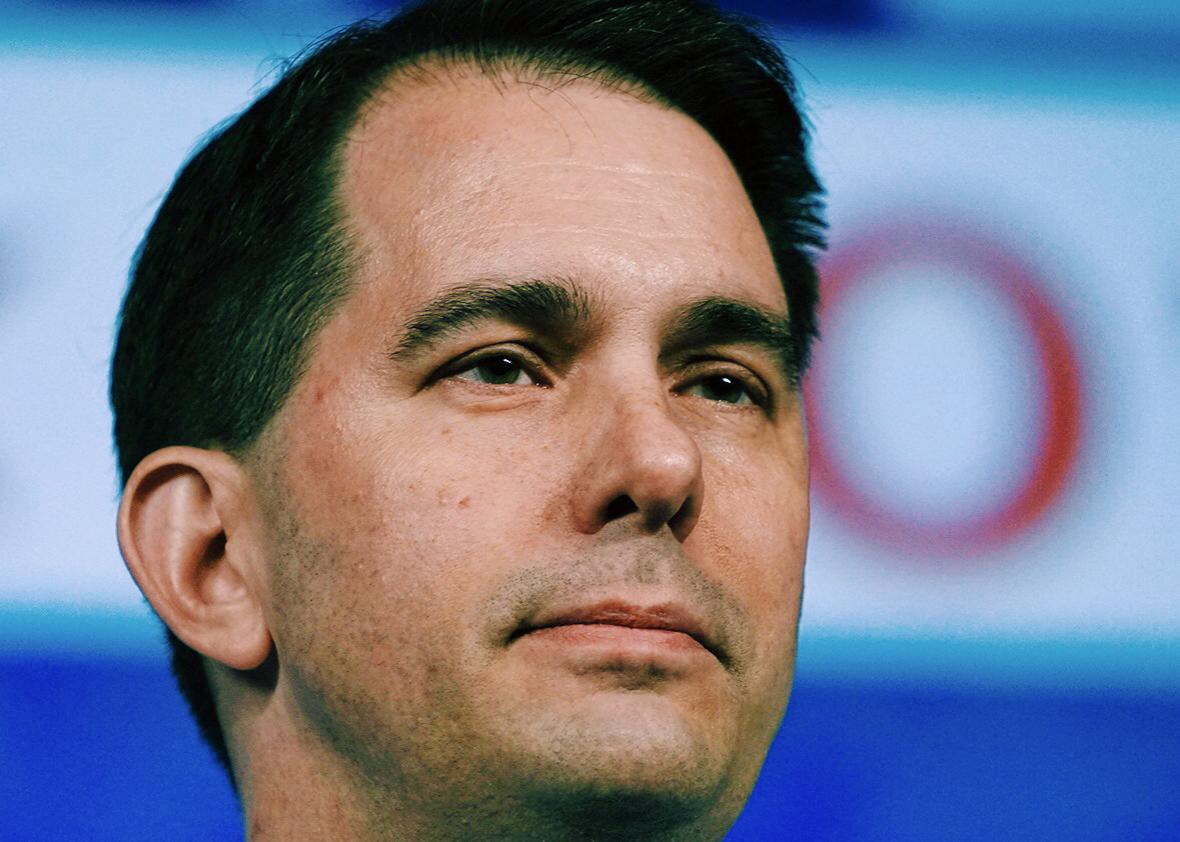On paper, Scott Walker is the perfect GOP presidential candidate. He is a governor, so he can claim to have the kind of executive experience one needs to take on the rigors of the presidency. Having first been elected to statewide office in 2010, Walker also passes Jonathan Rauch’s admittedly arbitrary but surprisingly useful “freshness test.” That is, he hasn’t been on the national political stage so long that we’ve grown tired of him. Walker is from the Upper Midwest, a region that has historically been fairly liberal but has grown more politically competitive in recent years. To get elected and re-elected as a conservative in a monolithically conservative state in the Deep South isn’t nearly as impressive as getting elected, beating back a recall effort, and then getting re-elected in a state like Wisconsin, which has backed the Democratic candidate in every presidential election since 1984.
Because Walker has devoted almost his entire adult life to public service, he hasn’t built the kind of fortune that made Mitt Romney and John McCain seem so out of touch with middle-income voters. Again, there’s nothing all that special about not making tens of millions in private equity, as Romney did, or not marrying into wealth, as McCain did. Yet there’s a lot of political appeal in having a Republican standard-bearer who buys his clothes at Kohl’s. Most interesting, to me at least, Walker never finished college. Though falling a few credits shy of a college degree isn’t a qualification in itself, it is striking that while more than 20 percent of America’s working-age population started college without finishing, these women and men are massively underrepresented in the uppermost echelons of our political ranks. Indeed, we haven’t had a president without an Ivy League degree since Reagan. Walker would break that mold, in a good way.
Then there is Walker’s disarming political style. Last summer, Tim Alberta of National Journal offered a comprehensive look at Walker’s tenure as governor and noticed that even Walker’s most determined opponents found him to be rather pleasant. Again and again, Walker is described as unpretentious, easy-going, soft-spoken, and self-effacing, qualities we’d associate more with a genial high school guidance counselor than with a man with a burning desire to be the leader of the free world. His Democratic opponents have routinely tried to rile him up with over-the-top personal attacks, to which Walker has responded with an almost unnerving calm. In the end, his fiercest critics have wound up making Walker look the part of the sober adult.
So why shouldn’t Republicans unite around Walker straight away? For one thing, recent winning presidential candidates enjoyed wider support in their home states than Walker currently enjoys in Wisconsin. George W. Bush won re-election as governor of Texas with more than 68 percent of the vote in 1998, and Barack Obama was elected to the U.S. Senate in Illinois with 70 percent of the vote. Every one of Walker’s statewide victories has been a squeaker by comparison. This could be a sign that Walker doesn’t wear well over time, and that one shouldn’t overstate the significance of Walker’s swing-state appeal. For many conservatives, however, the fact that Walker has proven such a polarizing figure reflects his willingness to sacrifice short-term popularity to achieve policy goals that will pay off over the long haul.
More concerning are the questions that have been raised about Walker’s failure to surround himself with high-quality personnel. Eliana Johnson of National Review reported back in March that the Wisconsin governor relies primarily on his own political judgment when making decisions, and that this self-reliance was undermining his embryonic presidential campaign. She pointed to botched hires and awkward flip-flops on a number of hotly debated policy questions, from the legal status of unauthorized immigrants to ethanol mandates, as indications that he was not quite ready for prime time. Jonathan Martin, writing for the New York Times, offered a similar assessment earlier this month, adding that Walker’s tendency to “think like an operative” might make him seem opportunistic and unprincipled.
All of this rings true to me. Walker has seemed oddly unmoored in his first few months on the campaign trail. The contrast between the Walker who refused to back down on limiting collective-bargaining rights, despite ferocious opposition from organized labor in Wisconsin and around the country, and the Walker who struggles to give a straight answer on issues like immigration and taxes out of fear of offending this or that GOP microconstituency is discouraging. One charitable explanation is that Walker simply hasn’t thought through his position on national issues. Just a few years ago, Walker was the executive of Milwaukee County, a role in which he didn’t have to have detailed positions on what to do about Social Security or ISIS or the fallout from Puerto Rico’s debt crisis. Unfortunately for Walker, that’s not going to be much of an excuse a month or two from now, when he’ll be subjected to scrutiny far more intense than anything he’s faced so far.
My fear is that instead of thinking through the most important policy questions facing the next president for himself, and offering a serious and substantive reform agenda, Walker will simply tell the most vocal pressure groups within the Republican coalition what they want to hear. That might be enough to help him secure the GOP presidential nomination, but it won’t be enough to win him the next election, even with all the blue-collar charisma in the world.
